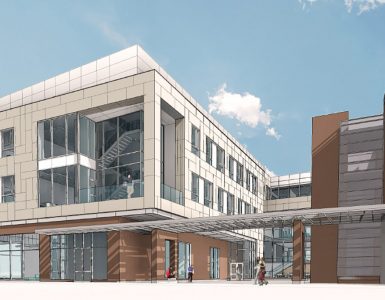Rep. John Carnevale, D-Providence and Johnston, introduced legislation in the General Assembly that would place a $50 fee per semester on every out-of-state student attending Brown, the Rhode Island School of Design and Johnson and Wales University Feb. 14. The money raised from this fee would cover the redevelopment of the land opened up by the relocation of I-195, an area each university included in the fee has expressed interest in acquiring. Carnevale said in a press release he chose to raise funds from these universities because he did not want the state to invest heavily in land that would ultimately benefit “wealthy institutions” more than taxpayers.
“If one of those schools buys some land today, relatively cheap, and sells it five years from now when the area is active and thriving, who will reap the profit? Not the taxpayers,” Carnevale said in the press release.
I’m not prepared at the moment to talk about how damn foolish I think this proposal is, but feel free to discuss amongst yourselves in the comments.





The redevelopment of this land can and should be one of few bright spots in RI. Why are we dragging this out so long, and proposing dumb complications like this? It’s not rocket science. Come up with a plan and make it happen!
I kind of feel like the city ought to develop some parameters for development–a plan for RIPTA routes, limits on parking, narrower streets for a pedestrian-friendly experience, mixed-use and mixed-size parcel zoning, and then let institutions compete to do what they want with the area. And I think it’s great that universities want a big part of this, but I also think that other smaller bidders should be allowed to get involved. It seems like they’re doing the opposite: allowing any old crappy land-use plan that destroys urban design, but micro-managing what is going to be built in the sense of what the buildings will be used for.
It always strikes me that government is deeply involved in the things it ought to leave alone, and not involved enough in the things it ought to be doing.
When this was announced a few weeks back I tweeted out a stream of expletives.
If Twitter search didn’t such so bad I’d link to it.
I can’t come up with a coherent paragraph, just rhetorical questions:
Shouldn’t URI pay too, with the Nursing School that was announced? Or RWU if they expand too?
Why is this being levied on the students, when the institutions are the ones that benefit from such a land squat?
Isn’t a major purpose of the I-195 commission to prevent land squatting?
What happens to that $50 per student?
Why does the State Assembly (once again) need to be involved in what should be managed by the City and its community?
One of the reasons proposals like this one continue to arise is that tax exempts like Brown University have an inappropriately generous tax-exempt status under RI law. Brown applies that unfair advantage to the detriment of the City of Providence and the State, and to the detriment of local private businesses and residents. Brown, the worst offender, always claims to the legislature that it needs a financial crutch to survive. Yet it continues to expand its real estate footprint throughout many of Providence’s most valuable neighborhoods as it also expands its billion-dollar endowment and increases its administrative salaries.
Recall that as part of Providence’s deal with Brown last year, the city — as difficult as it is to comprehend — quietly waived for ten years its right to challenge the scope of Brown’s tax exempt status. Aside from several historic streets and exclusive parking privileges that Brown gained, that very valuable waiver was what Brown really wanted under its agreement with the city.
Brown and the other major tax-exempts have become far too powerful politically and that power needs somehow to be scaled back. ASAP.
Actually, Bill, an agreement to not negotiate over the PILOT already existed during last year’s negotiations. This was part of Brown’s hesitancy– under previous administrations they had already established a 20 year plan with the same condition.
The notion that Brown is a net cost rather than net (very large) benefit is just ludicrous.
Part of the I-195 commission legislation requires that all non-profits sign agreements with the city prior to being able to purchase the land all but assuring that Providence can extract some kind of rent from the university before any expansion occurs. So they have that covered on the new land too.
If you want to just tax the shit out of Brown, dumb as that is, this is about the most ridiculous way to do it. It’s a bad excuse for the taxation. It’s a bad way to preallocate whatever funds come in. It creates stupid consequences. It’s not clever.
Carnevale should just be honest and keep reintroducing his plan to tax Brown and Brown should just keep easily lobbying to defeat it given the fact that the “most valuable land in Providence” would be worth shit without them.
Certainly no one has ever accused the General Assembly of being clever.
Jason,
The 1993 agreement between the City and Brown (the “Memorandum of Understanding”) was voluntary. By its terms, either side could terminate it at any time for any reason or for no reason. It did not prohibit the City from challenging the scope of Brown’s tax exempt status. In fact, in the period leading up to the most recent agreement last year, the City introduced a number of bills in the state legislature to do just that.
Who said that Brown is a net cost? Or that the goal of anyone is to “tax the shit out of Brown”? Not me. My point is that the scope of Brown’s tax exemption is far broader than the exemption that tax-exempts receive in other states. The unduly wide scope is unnecessary, is unfair to others in the State and City, and should be corrected. That’s not “taxing the shit out of Brown” — as you put it.
I agree there are better ways to have the major tax-exempts pay their fair share, especially within the City, than the current bill by Rep. Carnevale. But when the City waives its right to challenge directly a very unbalanced tax relationship between the City and the tax-exempts (by waiving its right to seek an overdue legislative solution), bills like this one should be expected.
Your claim that the City’s best real estate would be worthless without Brown’s presence misses the point. Because Brown and the other major tax-exempts occupy so much prime real estate, and are increasing their holdings annually, the burden on everyone else is too much — and private businesses and many residents find the area prohibitively expensive. The City can’t attract major private businesses without offering long-term tax deals — which serve to preserve the City’s insolvency. How many more public streets will the City try to sell this year?
Rep. Carnevale presumably cannot reintroduce bills from last year to challenge the scope of Brown’s tax-exempt status, by reason of the City’s completely inappropriate agreement with Brown last year to waive that right. Hence, you see bills this this, which seek to impose fees.
This proposal is a patent Dormant Commerce Clause violation (in other words, it is unconstitutional). The government would end up losing more money in legal fees defending this than they would ever raise enforcing it. For more, see the controversy over the now-defunct New York City commuter tax, which would have been legal if applied to all commuters but was found to be unconstitutional as applied to only those commuters entering the city from other states.
Correction to my 4:12 p.m. post above. My reference to the “1993 ‘Memorandum of Understanding'” between the City of Providence and Brown should have given 2003 as the date. It was signed by the Cicilline administration.
Aside from all the other mentions above on the silliness of this, the GA has a history of taking a “fee” that is earmarked for a specific project or program, then changing the definition of the “fee” to a “tax” instead, which makes it go into that gigantic vacuum cleaner of money called the General Assembly.
I agree with Bill’s comments above that the universities should start to pay taxes. At the very least, they should start to pay taxes on the numerous aspects of their business that are not educational–i.e., real estate holdings, huge gyms, stadiums, parking garages, and so on. The whole concept behind tax exempt status for colleges is supposed to be that we’re encouraging education, not that we’re trying to keep universities here. Philadelphia struggled with the same relationship with its universities when I was there, but it seems like it’s much worse in Providence.
I think taxing the schools, but only those aspects of the schools that are extraneous to education in its most direct meaning, would also probably have the effect of reining in the ridiculous market bubble we’ve made of education. At Temple, when I was there, the university was constantly embarking on some new, ridiculous project to build a ten story computer lab or a gigantic gym. And some of the services we make tax-free at universities are even less attractive than that–we talked extensively about the fact that free parking is ruining the city, but doesn’t RIC avoid any taxes on the holdings it has in parking? And then it gets to buy up streets on top of that.
I’m sure how RIC avoiding taxes does harm to the state… consider the fact that RIC is funded by the state… Yes, it also takes in donations, but it’s a state school. Paying taxes would be pointless because they’d end up right back there.
I do agree that any non-educational function of the universities should be taxed. However, I don’t consider athletic complexes to be non-educational. They are a normal part of a university. I do think that all parking should be taxed based on the square footage of the lot (so a parking garage would get taxed at the same rate as a surface lot with the same footprint to encourage parking garages rather than multiple surface lots).
The ruckus over non-profits somehow not paying their is just one of many problems and injustices that would be solved or mooted by shifting the tax burden off real estate and onto income and financial wealth.